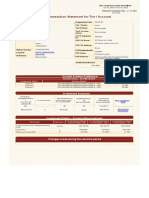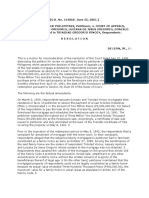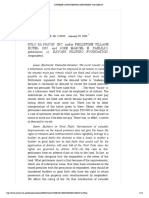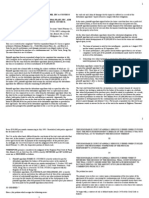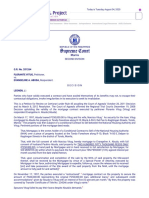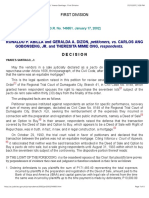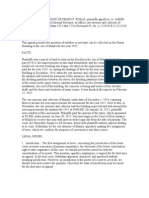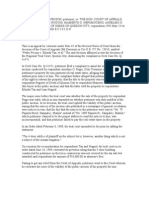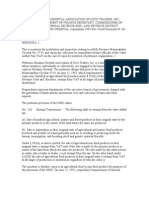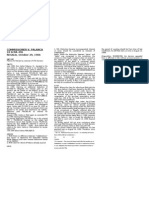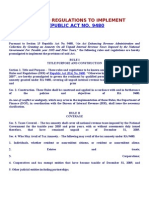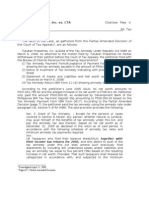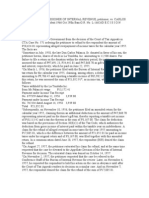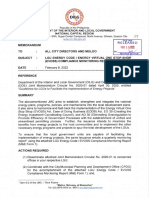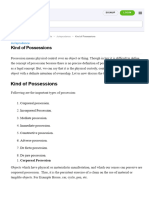Uy Tong V CA
Uy Tong V CA
Uploaded by
cmv mendozaCopyright:
Available Formats
Uy Tong V CA
Uy Tong V CA
Uploaded by
cmv mendozaOriginal Title
Copyright
Available Formats
Share this document
Did you find this document useful?
Is this content inappropriate?
Copyright:
Available Formats
Uy Tong V CA
Uy Tong V CA
Uploaded by
cmv mendozaCopyright:
Available Formats
Uy Tong vs. Court of Appeals May 2l, 1988. [GRN L-77465 May 2l, 1988.
*] SPOUSES UY TONG & KHO PO GIOK, petitioners, vs. HONORABLE COURT OF APPEALS, HONORABLE BIENVENIDO C. EJERCITO, Judge of the Court of First Instance of Manila, Branch XXXVII and BAYANIHAN AUTOMOTIVE CORPORATION, respondents. PETITION to review the decision of the Court of Appeals. The facts are stated in the opinion of the Court. Platon A. Baysa for petitioner. Manuel T. Ubarra for respondents. CORTES, J.: In the present petition, petitioners assail the validity of a deed of assignment over an apartment unit and the leasehold rights over the land on which the building housing the said apartment stands for allegedly being in the nature of a pactum commissorium. The facts are not disputed. Petitioners Uy Tong (also known as Henry Uy) and Kho Po Giok (SPOUSES) used to be the owners of Apartment No. 307 of the Ligaya Building, together with the leasehold right for ninety-nine (99) years over the land on which the building stands. The land is registered in the nameof Ligaya Investments, Inc. as evidenced by Transfer Certificate of Title No. 79420 of the Registry of Deeds of the City of Manila. It appears that Ligaya Investments, Inc. owned the building which houses the apartment units but sold Apartment No. 307 and leased a portion of the. land in which the building stands to the SPOUSES. In February, 1969, the SPOUSES purchased from private respondent Bayanihan Automotive, Inc. (BAYANIHAN) seven (7) units of motor vehicles for a total amount of P47,700.00 payable in three (3) installments. The transaction was evidenced by a written "Agreement" wherein the terms of payment had been specified as follows: That immediately upon signing of this Agreement, the VENDEE shall pay unto the VENDOR the amount of Seven Thousand Seven Hundred (P7,000.00) Pesos, Philippine Currency, and the amount of Fifteen Thousand (P15,000.00) Pesos shah be paid on or before March 30,1969 and the balance of Twenty Five Thousand (P25,000.00) Pesos shall be paid on or before April 30, 1969, the said amount again to be secured by another postdated check with maturity on April 30,1969 to be drawn by the VENDEE; That it is fully understood that should the two (2) aforementioned checks be not honored on their respective maturity dates, herein VENDOR will give VENDEE another sixty (60) days from maturity dates, within which to pay or redeem the value of the said checks; That if for any reason the VENDEE should fail to pay her aforementioned obligation to the VENDOR, the latter shall become automatically the owner of the former's apartment which is located at No. 307, Ligaya Building, Alvarado St., Binondo, Manila, with the only obligation on its part to pay unto the VENDEE the amount of Three Thousand Five Hundred Thirty Five (P3,535.00) Pesos, Philippine Currency; and in such event the VENDEE shall execute the corresponding Deed of Absolute Sale in favor of the VENVOR and/or Assignment of Leasehold Rights. [Italics supplied]. (Quoted in Decision in Civil Case No. 80420, Exhibit "A" of Civil Case No. 131532]. After making a downpayment of P7,700.00, the SPOUSES failed to pay the balance of P40,000.00. Due to these unpaid balances, BAYANIHAN filed an action for specific performance against the SPOUSES docketed as Civil Case No. 80420 with the Court of First Instance of Manila. On October 28, 1978, after hearing, judgment was rendered in favor of BAYANIHAN in a decision the dispositive portion of which reads: WHEREFORE, judgment is hereby rendered, ordering the defendants, jointly and severally, to pay the plaintiffs, the sum of P40,000.00, with interest at the legal rate from July 1, 1970 until full payment. In the event of their failure to do so within thirty (30) days from notice of this judgment, they are hereby ordered to execute the corresponding deed of absolute sale in favor of the plaintiff and/or the assignment of leasehold rights over the defendahts' apartment located at 307 Ligaya Building, Alvarado Street, Binondo, Manila, upon the payment by the plaintiff to the defendants of the sum of P3,535.00. [Italics supplied]. Pursuant to said judgment, an order for execution pending appeal was issued by the trial court and a deed of assignment dated May 27, 1972, was executed by the SPOUSES [Exhibit "B", CFI Records, p. 127] over Apartment No. 307 of the Ligaya Building together with the leasehold right over the land on which the building stands. The SPOUSES acknowledged receipt of the sum of P3,000.00 more or less, paid by BAYANIHAN pursuant to the said judgment. Notwithstanding the execution of the deed of assignment, the SPOUSES remained in possession of the premises. Subsequently, they were allowed to remain in the premises as lessees for a stipulated monthly rental until November 30, 1972. Despite the expiration of the said period, the SPOUSES failed to surrender possession of the premises in favor of BAYANIHAN. This prompted BAYANIHAN to file an ejectment case against them in the City Court of Manila docketed as Civil Case No. 240019. This action was however dismissed on the ground that BAYANIHAN was not the real party in interest, not being the owner of the building. On February 7, 1979, after demands to vacate the subject apartment made by BAYANIHAN's counsel was again ignored by the SPOUSES, an action for recovery of possession with damages was filed with the Court of First Instance of Manila, docketed as Civil Case No. 121532 against the SPOUSES and impleading Ligaya Investments, Inc. as party defendant. On March 17, 1981, decision in said case was rendered in favor of BAYANIHAN ordering the following: WHEREFORE, judgment is hereby rendered in favor of the plaintiff and against the defendants spouses UY TONG and KHO PO GIOK and defendant Ligaya Investment, Inc., dismissing defendants' counterclaim and ordering: 1. The defendants spouses UY TONG and KHO PO GIOK and any and/or persons claiming right under them, to vacate, surrender and deliver possession of Apartment 307, Ligaya Building, located at 64 Alvarado Street, Binondo, Manila to the plaintiff. 2. Ordering defendant Ligaya Investment, Inc. to recognize the right of ownership and possession of the plaintiff over Apartment No. 307, Ligaya Building; 3. Ordering Ligaya Investment, Inc. to acknowledge plaintiff as assigneelessee in lieu of defendants spouses Uy Tong and Kho Po Giok over the lot on which the building was constructed; 4. Ordering the defendants spouses Uy Tong and Kho Po Giok to pay to the plaintiff the sum of P200.00 commencing from June, 1971 to November 30, 1972, or a total amount of P3,400.00 as rental for the apartment, and the sum of P200.00 from December 1, 1972 until the premises are finally vacated and surrendered to the plaintiff, as reasonable compensation for the use of the apartment; and 5. Ordering the defendants spouses Uy Tong and Kho Po Giok to pay P3,000.00 as and for attorney's fees to the plaintiff, and the costs of this suit. Not satisfied with this decision, the SPOUSES appealed to the Court of Appeals. On October 2,1984, the respondent Court of Appeals affirmed in toto the decision appealed from [Petition, Annex "A", Rollo, pp. 15-20]. A motion for reconsideration of the said decision was denied by the respondent Court in a resolution dated February 11, 1987 [Petition, Annex "C", Rollo, pp. 31-34]. Petitioners-SPOUSES in seeking a reversal of the decision of the Court of Appeals rely on the following reasons: I. The deed of assignment is null and void because it is in the nature of a pactum commissorium and/or was borne out of the same. II. The genuineness and due execution of the deed of assignment was not deemed admitted by petitioner. III. The deed of assignment is unenforceable because the condition for its execution was not complied with. IV. The refusal of petitioners to vacate and surrender the premises in question to private respondent is justified and warranted by the circumstances obtaining in the instant case.
I. In support of the first argument, petitioners bring to the fore the contract entered into by the parties whereby petitioner Kho Po Giok agreed that the apartment in question will automatically become the property of private respondent BAYANIHAN upon her mere failure to pay her obligation. This agreement, according to the petitioners is in the nature of a pactum commissorium which is null and void, hence, the deed of assignment which was home out of the same agreement suffers the same fate. The prohibition on pactum commissorium stipulations is provided for by Article 2088 of the Civil Code: Art. 2088. The creditor cannot appropriate the things given by way of pledge or mortgage, or dispose of the same. Any stipulation to the contrary is null and void. The aforequoted provision furnishes the two elements for pactum commissorium to exist: (1) that there should be a pledge or mortgage wherein a property is pledged or mortgaged by way of security for the payment of the principal obligation; and (2) that there should be a stipulation for an automatic appropriation by the creditor of the thing pledged or mortgaged in the event of nonpayment of the principal obligation within the stipulated period. A perusal of the terms of the questioned agreement evinces no basis for the application of the pactum commissorium provision. First, there is no indication of any contract of mortgage entered into by the parties. It is a fact that the parties agreed on the sale and purchase of trucks. Second, there is no case of automatic appropriation of the property by BAYANIHAN. When the SPOUSES defaulted in their payments of the second and third installments of the trucks they purchased, BAYANIHAN filed an action in court for specific performance. The trial court rendered favorable judgment for BAYANIHAN and ordered the SPOUSES to pay the balance of their obligation and in case of failure to do so, to execute a deed of assignment over the property involved in this case. The SPOUSES elected to execute the deed of assignment pursuant to said judgment. Clearly, there was no automatic vesting of title on BAYANIHAN because it took the intervention of the trial court to exact fulfillment of the obligation, which, by its very nature is ". . . anathema to the concept of pacto commissorio" [Northern Motors, Inc. v. Herrera, G.R. No. L-32674, February 22, 1973, 49 SCRA 392]. And even granting that the original agreement between the parties had the badges of pactum commissorium, the deed of assignment does not suffer the same fate as this was executed pursuant to a valid judgment in Civil Case No. 80420 as can be gleaned from its very terms and conditions: DEED OF ASSIGNMENT KNOW ALL MEN BY THESE PRESENTS: This deed made and entered into by Uy Tiong also known as Henry Uy and Kho Po Giok, both of legal age, husband and wife, respectively, and presently residing at 307 Ligaya Bldg., Alvarado St., Binondo, Manila, and hereinafter to be known and called as the ASSIGNORS, in favor of Bayanihan Automotive Corporation, an entity duly organized and existing under the laws of the Philippines, with principal business address at 1690 Otis St., Paw, Manila and hereinafter to be known and called the ASSIGNEE; -witnessethWHEREAS, the ASSIGNEE has filed a civil complaint for "Specific Performance with Damages" against the ASSIGNORS in the Court of First Instance of Manila, Branch V, said case having been docketed as Civil Case No. 80420; WHEREAS, the ASSIGNEE was able to obtain a judgment against the ASSIGNOR wherein the latter was ordered by the court as follows, to wit: WHEREFORE, judgment is hereby rendered ordering the defendants, jointly and severally to pay the plaintiff the sum of P40,000.00, with interest at the legal rate from July 31, 1970 until full payment. In the event of their failure to do so within thirty (30) days from notice of this judgment, they are hereby ordered to execute the corresponding deed of absolute sale in favor of the plaintiff and/or the assignment of leasehold, rights over the defendants' apartment located at No. 307 Ligaya Building, Alvarado Street, Binondo, Manila, upon the payment by the plaintiff to the defendants the sum of P3,535.00. The defendants shall pay the costs. WHEREAS, the court, upon petition by herein ASSIGNEE and its deposit of sufficient bond, has ordered for the immediate execution of the said decision even pending appeal of the aforesaid decision; WHEREAS, the ASSIGNORS have elected to just execute the necessary deed of sale and/or assignment of leasehold rights over the apartment mentioned in the decision in favorof the herein ASSIGNEE; NOW, THEREFORE, for and in consideration of the foregoing premises, the ASSIGNORS have transferred assigned and ceded, and by these presents do hereby transfer, assign and cede all their rights and interests over that place known as Apartment No. 307 at the Ligaya Building which is located at No. 864 Alvarado St., Binondo, Manila, together with the corresponding leasehold rights over the lot on which the said building is constructed, in favor of the herein ASSIGNEE, its heirs or assigns. IN WITNESS WHEREOF, We have hereunto signed our names this 27th day of May, 1971 at Manila, Philippines. UY TONG/HENRY UYKHO PO GIOK AssignorAssignor ACR-2151166 Manila 1/13/51ACR-C-001620 Manila March 3, 1965 This being the case, there is no reason to impugn the Validity of the said deed of assignment. II. The SPOUSES take exception to the ruling of the Court of Appeals that their failure to deny the genuineness and due execution of the deed of assignment was deemed an admission thereof The basis for this exception is the SPOUSES' insistence that the deed of assignment having been borne out of pactum commissorium is not subject to ratification and its invalidity cannot be waived. There is no compelling reason to reverse the abovementioned ruling of the appellate court. Considering this Court's above conclusion that the deed of assignment is not invalid, it follows that when an action founded on this written instrument is filed, the rule on contesting its genuineness and due execution must be followed. That facts reveal that the action in Civil Case No. 121532 was founded on the deed of assignment. However, the SPOUSES, in their answer to the complaint, failed to deny under oath and specifically the genuineness and due execution of the said deed. Perforce, under Section 8, Rule 8 of the Revised Rules of Court, the SPOUSES are deemed to have admitted the deed's genuineness and due execution. Besides, they themselves admit that ". . . the contract was duly executed and that the same is genuine" [Sur-Rejoinder, Rollo, p. 67]. They cannot now claim otherwise. III. The SPOUSES also question the enforceability of the deed of assignment. They contend that the deed is unenforceable because the condition for its execution was not complied with. What petitioners SPOUSES refer to is that portion of the disposition in Civil Case No. 80420 requiring BAYANIHAN to pay the former the sum of P3,535.00. To buttress their claim of non-compliance, they invoke the following receipt issued by the SPOUSES to show that BAYANIHAN was P535.00 short of the complete payment. RECEIPT This is to acknowledge the fact that the amount of THREE THOUSAND (P3,000.00) PESOS, more or less as indicated in the judgment of the Hon. Conrado Vasquez, Presiding Judge of the Court of First Instance of Manila, Branch V, in Civil Case entitled 'Bayanihan Automotive Corp. v. Kho (sic) Po Giok, etc." and docketed as Civil Case No. 80420 has been applied for the payment of the previous rentals of the property which is the subject matter of the aforesaid judgment. [Italics supplied.] (Sgd.) Kho (sic) Po Giok (Sgd.) Henry Uy
August 21, 1971 The issue presented involves a question of fact which is not within this Court's competence to look into. Suffice it to say that this Court is of the view that findings and conclusion of the trial court and the Court of Appeals on the question of whether there was compliance by BAYANIHAN of its obligation under the decision in Civil Case No. 80420 to pay the SPOUSES the sum of P3,535.00 is home by the evidence on record. The Court finds merit in the following findings of the trial court: ". . . Defendants' contention that the P3,535.00 required in the decision in Civil Case No. 80420 as a condition for the execution of the deed of assignment was not paid by the plaintiff to the defendants is belied by the fact that the defendants acknowledged payment of P3,000.00, more or less, in a receipt dated August 21, 1971. This amount was expressly mentioned in this receipt as indicated in the judgment of the Honorable Conrado Vasquez, presiding Judge of the CFI of Manila, Branch V, in Civil Case entitled Bayanihan Automotive Corp. versus Kho Po Giok, docketed as Civil Case No. 80420, and also expressly mentioned as having been applied for the payment of the previous rentals of the property subject matter of the said judgment. Nothing could be more explicit. The contention that there is still a difference of P535.00 is hard to believe because the spouses Kho Po Giok and Uy Tong executed the deed of assignment without first demanding from the plaintiff the payment of P535.00. Indeed, as contended by the plaintiff, for it to refuse to pay this small amount and thus gave defendants a reason not to execute the Deed of Assignment. is hard to believe. Defendants further confirm by the joint manifestation of plaintiff and defendants, duly assisted by counsel, Puerto and Associates, dated September, 1971, Exhibit "O", wherein it was stated that plaintiff has fully complied with its obligation to the defendants caused upon it (sic) by the pronouncement of the judgment as a condition for the execution of their (sic) leasehold rights of defendants, as evidenced by the receipt duly executed by the defendants, and which was already submitted in open court for the consideration of the sum of P3.535.00. [Italics supplied]. [Decision, Civil Case No. 121532, pp. 3-4]. This Court agrees with private respondent BAYANIHAN's reasoning that inasmuch as the decision in Civil Case No. 80420 imposed upon the parties correlative obligations which were simultaneously demandable so much so that if private respondent refused to comply with its obligation under the judgment to pay the sum of P3,535.00 then it could not compel petitioners to comply with their own obligation to execute the deed of assignment over the subject premises. The fact that petitioners executed the deed of Assignment with the assistance of their counsel leads to no other conclusion that private respondent itself had paid the fall amount. IV. Petitioners attempt to justify their continued refusal to vacate the premises subject of this litigation on the following grounds: (a) The deed of assignment is in the nature of a pactum commissorium and, therefore, null and void. (b) There was no full compliance by private respondent of the condition imposed in the deed of assignment. (c) Proof that petitioners have been allowed to stay in the premises, is the very admission of private respondent who declared that petitioners were allowed to stay in the premises until November 20, 1972. This admission is very significant. Private respondent merely stated that there was a termuntil November 30, 1972-in order to give a semblance of validity to its attempt to dispossess herein petitioners of the subject premises. In short, this is one way of rendering seemingly illegal petitioners' possession of the premises after November 30,1972. The first two classifications are mere reiterations of the arguments presented by the petitioners and which had been passed upon already in this decision. As regards the third ground, it is enough to state that the deed of assignment has vested in the private respondent the rights and interests of the SPOUSES over the apartment unit in question including the leasehold rights over the land on which the building stands. BAYANIHAN is therefore entitled to the possession thereof These are the clear terms of the deed of assignment which cannot be superseded by bare allegations of fact that find no support in the record. WHEREFORE, the petition is hereby DENIED for lack of merit and the decision of the Court of Appeals is AFFIRMED in toto. SO ORDERED. Fernan (Chairman); Gutierrez, Jr. and Feliciano, JJ., concur. Bidin, J., no part. Appurtenanted in the appealed decision of respondent Court of Appeals. Petition denied. Decision affirmed.
You might also like
- History of The Church of PentecostDocument22 pagesHistory of The Church of PentecostBoachie Agyemang-Adolf100% (1)
- NPS CertificateDocument2 pagesNPS CertificateSatish Tiwari100% (1)
- Simple Guide for Drafting of Civil Suits in IndiaFrom EverandSimple Guide for Drafting of Civil Suits in IndiaRating: 4.5 out of 5 stars4.5/5 (4)
- Credit Risk PolicyDocument32 pagesCredit Risk PolicyRajib Ranjan Samal100% (1)
- 7th Grade Civics Eoc Essential Questions Quick GuideDocument1 page7th Grade Civics Eoc Essential Questions Quick Guideapi-374843811No ratings yet
- Cases-Chapters 1 To 5 - Pledge and Mortgage Antichresis and Chattel MortgageDocument72 pagesCases-Chapters 1 To 5 - Pledge and Mortgage Antichresis and Chattel MortgageNimpa PichayNo ratings yet
- Credtrans - Uy Tong V CA 1988Document1 pageCredtrans - Uy Tong V CA 1988Richel Dean SolisNo ratings yet
- Spouses Uy Tong V CADocument2 pagesSpouses Uy Tong V CAPax AlquizaNo ratings yet
- Sales Cases For DigestDocument54 pagesSales Cases For DigestTata BentorNo ratings yet
- Tan v. Court of AppealsDocument9 pagesTan v. Court of AppealsMico Maagma CarpioNo ratings yet
- Sulo NG Nayon vs. Nayong Pilipino GR No. 170923 January 20, 2009Document11 pagesSulo NG Nayon vs. Nayong Pilipino GR No. 170923 January 20, 2009lassenNo ratings yet
- Supreme Court: Noe Villanueva For Petitioner. Jose Beltran For Private RespondentsDocument13 pagesSupreme Court: Noe Villanueva For Petitioner. Jose Beltran For Private RespondentsthebluesharpieNo ratings yet
- Sulo Sa Nayon v. Nayong PilipinoDocument13 pagesSulo Sa Nayon v. Nayong PilipinoRenceNo ratings yet
- Sulo Sa Nayon V Nayong FilipinoDocument12 pagesSulo Sa Nayon V Nayong Filipinonaldsdomingo0% (1)
- Spouses Uy Tong v. CA Facts: Uy Tong (Also Known As Henry Uy) and Kho Po Giok (SPOUSES) Used To Be The Owners ofDocument1 pageSpouses Uy Tong v. CA Facts: Uy Tong (Also Known As Henry Uy) and Kho Po Giok (SPOUSES) Used To Be The Owners ofCesyl Patricia BallesterosNo ratings yet
- Bautista V UnangstDocument14 pagesBautista V UnangstRuth Abigail R. Acero-FloresNo ratings yet
- Petitioners Vs Vs Respondent: First DivisionDocument9 pagesPetitioners Vs Vs Respondent: First DivisionTintin SumawayNo ratings yet
- 05 Umale v. Canoga Park Development Corp.Document4 pages05 Umale v. Canoga Park Development Corp.Charles MagistradoNo ratings yet
- GR 167246 Umale V CanogaDocument4 pagesGR 167246 Umale V CanogaRogie ToriagaNo ratings yet
- Petitioners Vs Vs Respondents: First DivisionDocument9 pagesPetitioners Vs Vs Respondents: First DivisionRommel Joseph HeyrosaNo ratings yet
- Bustamante Vs RoselDocument5 pagesBustamante Vs RoselCelver Joy Gaviola TampariaNo ratings yet
- PropertyDocument19 pagesPropertyAlyssa Mari ReyesNo ratings yet
- Uy Tong Vs CADocument2 pagesUy Tong Vs CAFai Meile100% (1)
- Oblicon 3Document152 pagesOblicon 3Karl Anthony Tence DionisioNo ratings yet
- Union Bank vs. CA, 25 June 2001Document5 pagesUnion Bank vs. CA, 25 June 2001doora keysNo ratings yet
- Supreme Court: Agapito Ducusin in His Own Behalf. Roberto Brodette For RespondentsDocument9 pagesSupreme Court: Agapito Ducusin in His Own Behalf. Roberto Brodette For Respondentsthebluesharpie100% (1)
- Zulueta vs. Mariano G.R. No. L-29360Document4 pagesZulueta vs. Mariano G.R. No. L-29360Gendale Am-isNo ratings yet
- Sulo vs. Nayong Pilipino FoundationDocument14 pagesSulo vs. Nayong Pilipino FoundationresjudicataNo ratings yet
- Second Division G.R. No. 201264, January 11, 2016 FLORANTE VITUG, Petitioner, v. EVANGELINE A. ABUDA, Respondent. Decision Leonen, J.Document17 pagesSecond Division G.R. No. 201264, January 11, 2016 FLORANTE VITUG, Petitioner, v. EVANGELINE A. ABUDA, Respondent. Decision Leonen, J.Jenely Joy Areola-TelanNo ratings yet
- Sales CasesDocument107 pagesSales CasesLorraine DianoNo ratings yet
- Pacific Banking Corporation VsDocument9 pagesPacific Banking Corporation VsReth GuevarraNo ratings yet
- Bustamante v. RoselDocument4 pagesBustamante v. RoselVeraNataaNo ratings yet
- Agustin vs. de Vera, 900 SCRA 203, April 03, 2019Document12 pagesAgustin vs. de Vera, 900 SCRA 203, April 03, 2019j0d3No ratings yet
- Benjamin Bautista v. Shirley UnangastDocument11 pagesBenjamin Bautista v. Shirley UnangastJeric Anne Azores-PresnediNo ratings yet
- Vitug v. AbudaDocument20 pagesVitug v. Abudamarites ongtengcoNo ratings yet
- G.R. No. L-36902 January 30, 1982 LUIS PICHEL, Petitioner, PRUDENCIO ALONZO, RespondentDocument7 pagesG.R. No. L-36902 January 30, 1982 LUIS PICHEL, Petitioner, PRUDENCIO ALONZO, RespondentCharles Roger RayaNo ratings yet
- Agustin Vs CADocument3 pagesAgustin Vs CAbebebaaNo ratings yet
- Pichel v. Alonzo 111 SCRA 34 (1981Document7 pagesPichel v. Alonzo 111 SCRA 34 (1981JMae MagatNo ratings yet
- Pichel Vs AlonzoDocument7 pagesPichel Vs Alonzobrida athenaNo ratings yet
- McLaughlin v. CADocument3 pagesMcLaughlin v. CAFrench TemplonuevoNo ratings yet
- ATP CasesDocument256 pagesATP CasesEmma SchultzNo ratings yet
- Almario Siapian vs. Court of Appeals, Et Al.Document6 pagesAlmario Siapian vs. Court of Appeals, Et Al.PeterD'Rock WithJason D'ArgonautNo ratings yet
- Fort Bonifacio Vs Yllas LendingDocument4 pagesFort Bonifacio Vs Yllas Lendingposh cbNo ratings yet
- G.R. No. 201264, January 11, 2016 FLORANTE VITUG, Petitioner, v. EVANGELINE A. ABUDA, Respondent. Decision Leonen, J.Document136 pagesG.R. No. 201264, January 11, 2016 FLORANTE VITUG, Petitioner, v. EVANGELINE A. ABUDA, Respondent. Decision Leonen, J.Ronna Faith MonzonNo ratings yet
- A. Francisco Realty and Development Corp. v. Court of AppealsDocument9 pagesA. Francisco Realty and Development Corp. v. Court of Appealscompliance.payeahNo ratings yet
- 30 G.R. No. 147405 April 25, 2006 Platinum Plans Phil. Inc Vs CucuecoDocument6 pages30 G.R. No. 147405 April 25, 2006 Platinum Plans Phil. Inc Vs CucuecorodolfoverdidajrNo ratings yet
- Pitch ElDocument8 pagesPitch ElAnonymous hbUJnBNo ratings yet
- Solid Homes V TanDocument8 pagesSolid Homes V TanthebluesharpieNo ratings yet
- Umale Vs CanogaDocument5 pagesUmale Vs CanogaJerick Christian P DagdaganNo ratings yet
- Sulo Sa Nayon v. Nayong PilipinoDocument8 pagesSulo Sa Nayon v. Nayong PilipinoJoanne CamacamNo ratings yet
- Umale vs. Canoga Park Development CorporationDocument3 pagesUmale vs. Canoga Park Development CorporationJoseph MacalintalNo ratings yet
- Torres Vs CADocument10 pagesTorres Vs CAgsNo ratings yet
- Asia Prod vs. Lolita LeeDocument6 pagesAsia Prod vs. Lolita LeeTats YumulNo ratings yet
- Umale V Canoga Park - No Litis Pendentia When Diff Causes of Action Unlawful DetainerDocument5 pagesUmale V Canoga Park - No Litis Pendentia When Diff Causes of Action Unlawful DetainerJade Palace TribezNo ratings yet
- Civil Law - Sunday CalendarDocument57 pagesCivil Law - Sunday CalendarNaoimi LeañoNo ratings yet
- Unlawful Detainer JurisprudenceDocument70 pagesUnlawful Detainer JurisprudencePen Malubag100% (2)
- Solid Homes vs. Sps. TanDocument10 pagesSolid Homes vs. Sps. TanKiko AguilarNo ratings yet
- January 11, 2016 G.R. No. 201264 FLORANTE VITUG, Petitioner, EVANGELINE A. ABUDA, RespondentDocument16 pagesJanuary 11, 2016 G.R. No. 201264 FLORANTE VITUG, Petitioner, EVANGELINE A. ABUDA, RespondentAliyahDazaSandersNo ratings yet
- 012 Hipolito Agustin and Imelda Agustin Vs Romana de Vera - G.R. No. 233455 PDFDocument12 pages012 Hipolito Agustin and Imelda Agustin Vs Romana de Vera - G.R. No. 233455 PDFPaul ToguayNo ratings yet
- Abilla v. GobonsengDocument5 pagesAbilla v. GobonsengAiyla AnonasNo ratings yet
- Umale - v. - Canoga - Park - Development - Corp.20220111-12-Tfd3urDocument6 pagesUmale - v. - Canoga - Park - Development - Corp.20220111-12-Tfd3urmarie janNo ratings yet
- DEL CASTILLO Vda. DE MISTICA vs. SPOUSES NAGUIAT, G.R. NO. 137909, December 11, 2003Document5 pagesDEL CASTILLO Vda. DE MISTICA vs. SPOUSES NAGUIAT, G.R. NO. 137909, December 11, 2003Jomar TenezaNo ratings yet
- Central Bank V BicharaDocument11 pagesCentral Bank V BicharathebluesharpieNo ratings yet
- Patent Laws of the Republic of Hawaii and Rules of Practice in the Patent OfficeFrom EverandPatent Laws of the Republic of Hawaii and Rules of Practice in the Patent OfficeNo ratings yet
- Wage Computation TableDocument1 pageWage Computation Tablecmv mendozaNo ratings yet
- DOJ Circular No. 18, 18 June 2014Document2 pagesDOJ Circular No. 18, 18 June 2014cmv mendozaNo ratings yet
- Court of Tax Appeals: Republic of The PhilippinesDocument28 pagesCourt of Tax Appeals: Republic of The Philippinescmv mendozaNo ratings yet
- Roxas vs. RaffertyDocument6 pagesRoxas vs. Raffertycmv mendozaNo ratings yet
- BIR Revenue Memorandum Order 10-2014Document17 pagesBIR Revenue Memorandum Order 10-2014PortCalls100% (4)
- Taganito vs. Commissioner (1995)Document2 pagesTaganito vs. Commissioner (1995)cmv mendozaNo ratings yet
- Umali vs. EstanislaoDocument8 pagesUmali vs. Estanislaocmv mendozaNo ratings yet
- Pecson vs. CADocument4 pagesPecson vs. CAcmv mendozaNo ratings yet
- Misamis Oriental Assn vs. Dept of FinanceDocument6 pagesMisamis Oriental Assn vs. Dept of Financecmv mendozaNo ratings yet
- PNP Manual PDFDocument114 pagesPNP Manual PDFIrish PD100% (9)
- Republic Bank V EbradaDocument9 pagesRepublic Bank V Ebradacmv mendozaNo ratings yet
- BIR Form No. 0618 Download: (Zipped Excel) PDFDocument6 pagesBIR Form No. 0618 Download: (Zipped Excel) PDFcmv mendozaNo ratings yet
- Osmena vs. OrbosDocument9 pagesOsmena vs. Orboscmv mendozaNo ratings yet
- Tax NotesDocument10 pagesTax Notescmv mendozaNo ratings yet
- Tax 1 - TereDocument57 pagesTax 1 - Terecmv mendoza100% (1)
- 1 - Conwi vs. CTA DigestDocument2 pages1 - Conwi vs. CTA Digestcmv mendozaNo ratings yet
- Republic Bank V EbradaDocument9 pagesRepublic Bank V Ebradacmv mendozaNo ratings yet
- Remedies Under NIRCDocument14 pagesRemedies Under NIRCcmv mendoza100% (3)
- Ra 9480Document6 pagesRa 9480cmv mendozaNo ratings yet
- 9 - Commissioner vs. PalancaDocument1 page9 - Commissioner vs. Palancacmv mendozaNo ratings yet
- Primer On The Tax Amnesty Act of 2007Document8 pagesPrimer On The Tax Amnesty Act of 2007cmv mendozaNo ratings yet
- IRR of RA 9480Document7 pagesIRR of RA 9480cmv mendozaNo ratings yet
- Appellants Brief Tutuban CaseDocument4 pagesAppellants Brief Tutuban Casecmv mendozaNo ratings yet
- Remedies Under Local Government CodeDocument15 pagesRemedies Under Local Government Codecmv mendoza100% (4)
- Commissioner vs. PalancaDocument6 pagesCommissioner vs. Palancacmv mendozaNo ratings yet
- Conwi vs. CTADocument10 pagesConwi vs. CTAcmv mendozaNo ratings yet
- Taxation - 8 Tax Remedies Under NIRCDocument34 pagesTaxation - 8 Tax Remedies Under NIRCcmv mendoza100% (3)
- Tax Alert - 2006 - OctDocument8 pagesTax Alert - 2006 - Octcmv mendozaNo ratings yet
- Tax 2 Finals ReviewerDocument19 pagesTax 2 Finals Reviewerapi-3837022100% (2)
- Taxation - 7 Tax Remedies Under LGCDocument3 pagesTaxation - 7 Tax Remedies Under LGCcmv mendozaNo ratings yet
- Damages Principles in Investment Arbitration PDFDocument31 pagesDamages Principles in Investment Arbitration PDFKirti VyasNo ratings yet
- CDBL Annual Report AR - 2023 - 2023!12!10Document47 pagesCDBL Annual Report AR - 2023 - 2023!12!10school.friends.mutual.fundNo ratings yet
- Hernando Cases 2Document15 pagesHernando Cases 2Mary Pretty ConsolacionNo ratings yet
- A-No. 20 Del Rosario v. Pascua JDocument2 pagesA-No. 20 Del Rosario v. Pascua JThea Damole CapuyanNo ratings yet
- Poston 1Document6 pagesPoston 1api-317968170No ratings yet
- Krispy Kreme Case Study Solution FinanceDocument32 pagesKrispy Kreme Case Study Solution FinanceMd Sakawat HossainNo ratings yet
- Memorandum - LGU Energy CodeEnergy Virtual One Stop-Shop Compliance Monitoring ReportDocument3 pagesMemorandum - LGU Energy CodeEnergy Virtual One Stop-Shop Compliance Monitoring ReportLiliBeltranManera-valviejaNo ratings yet
- 2N3906 DatasheetDocument11 pages2N3906 DatasheetLeanneGarcia2000No ratings yet
- Tintin and The Extended EssayDocument25 pagesTintin and The Extended EssayJonathan Leschinski67% (3)
- Social Entitlement Tribunal - DecisionsDocument7 pagesSocial Entitlement Tribunal - DecisionsParliamentary Ombudsman (PHSO) TravestyNo ratings yet
- Exercise - Q Financial Structure 2Document8 pagesExercise - Q Financial Structure 2Hà TrangNo ratings yet
- Syllabus For Promotion To The Rank of InspectorDocument9 pagesSyllabus For Promotion To The Rank of InspectorAssistant Budget & Accounts OfficerNo ratings yet
- Questions On TNPID Related JudgementsDocument6 pagesQuestions On TNPID Related JudgementsSimon AlexNo ratings yet
- Checklist For Form 22A (Active Form) : Information Required Sl. NoDocument3 pagesChecklist For Form 22A (Active Form) : Information Required Sl. NoGuru100% (1)
- Pita Permatasari 163-183 PDFDocument21 pagesPita Permatasari 163-183 PDFDistrict9 ApartmentNo ratings yet
- Amendment in Affiliation Bye-Laws of The Board - Rule 3.3 (I) Chapter II-regDocument2 pagesAmendment in Affiliation Bye-Laws of The Board - Rule 3.3 (I) Chapter II-regfreehomedelivery.net100% (1)
- Purchase Process PDFDocument10 pagesPurchase Process PDFLalo SalamancaNo ratings yet
- Mini-Packet - City Council B Session - 20220126203552207Document28 pagesMini-Packet - City Council B Session - 20220126203552207Ivan HerreraNo ratings yet
- Possession Notes 2 by TopperDocument7 pagesPossession Notes 2 by TopperDr. Pramod YadavNo ratings yet
- Krivenko v. Register of DeedDocument6 pagesKrivenko v. Register of DeedSecret BookNo ratings yet
- Computer Contracts-Chap5Document32 pagesComputer Contracts-Chap5Shahbaz EnginrNo ratings yet
- Rights Ands Obligations of The Lessor and LesseeDocument4 pagesRights Ands Obligations of The Lessor and LesseeFrancis PunoNo ratings yet
- Ten Held After Clash: Ukraine Votes Amid WorriesDocument28 pagesTen Held After Clash: Ukraine Votes Amid WorriesកំពូលបុរសឯកាNo ratings yet
- Handle PaperworkDocument3 pagesHandle PaperworkAngelicaJhoyEscosioNo ratings yet
- Local Special BodiesDocument3 pagesLocal Special BodiesRu Hani FahNo ratings yet
- UNITED PEPSI-COLA SUPERVISORY UNION vs. HON. LAGUESMADocument1 pageUNITED PEPSI-COLA SUPERVISORY UNION vs. HON. LAGUESMAPatricia MaeNo ratings yet

